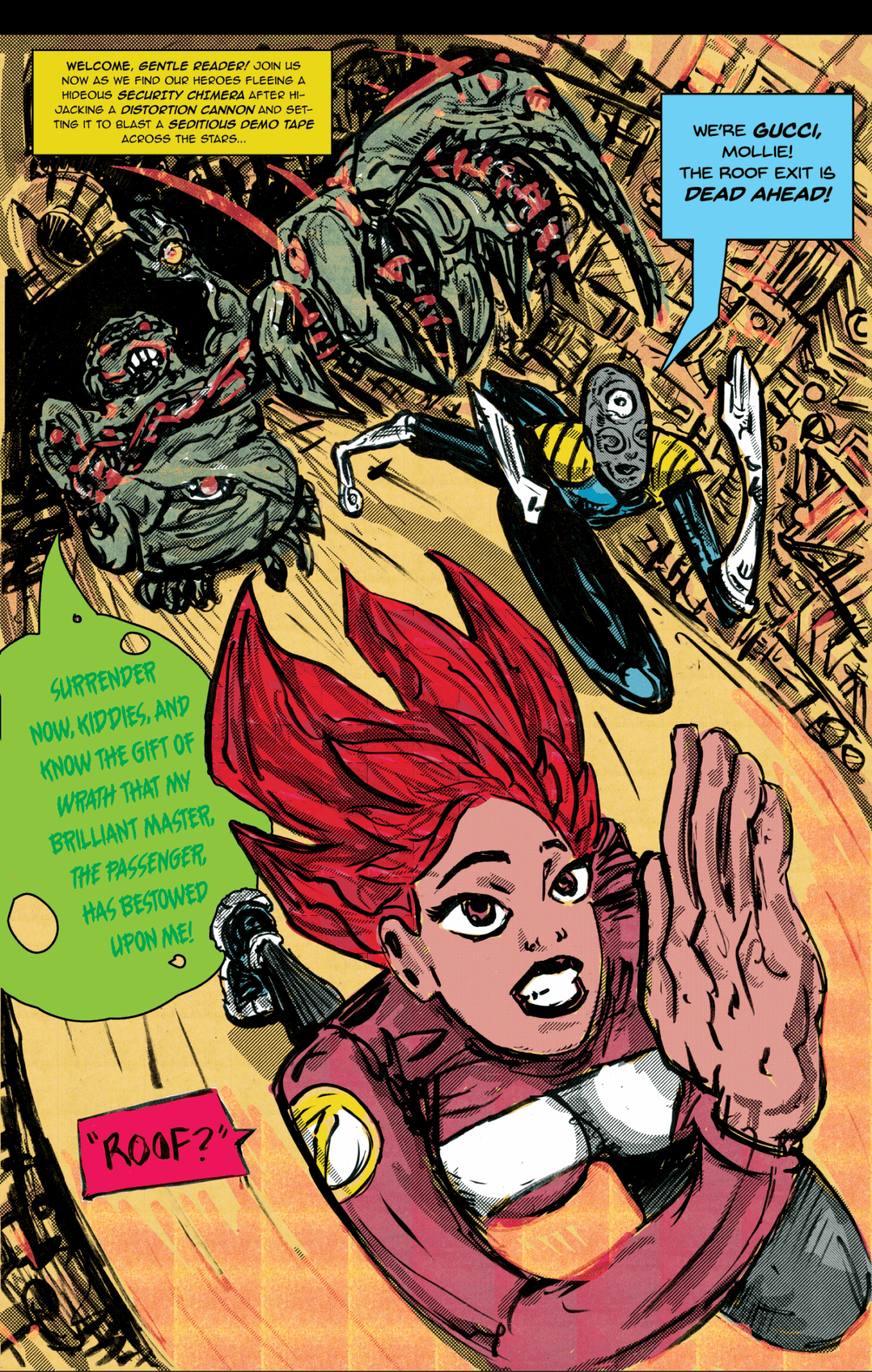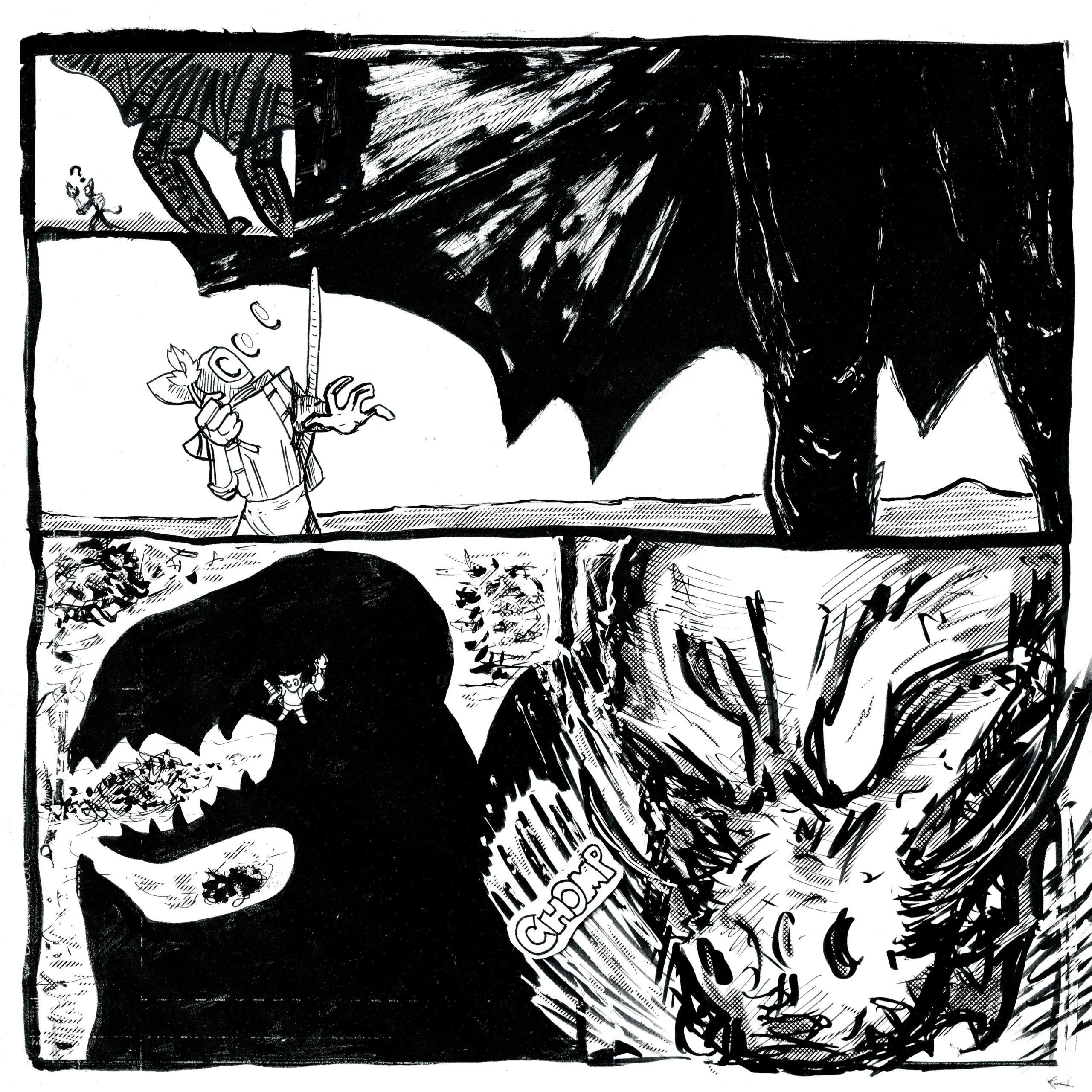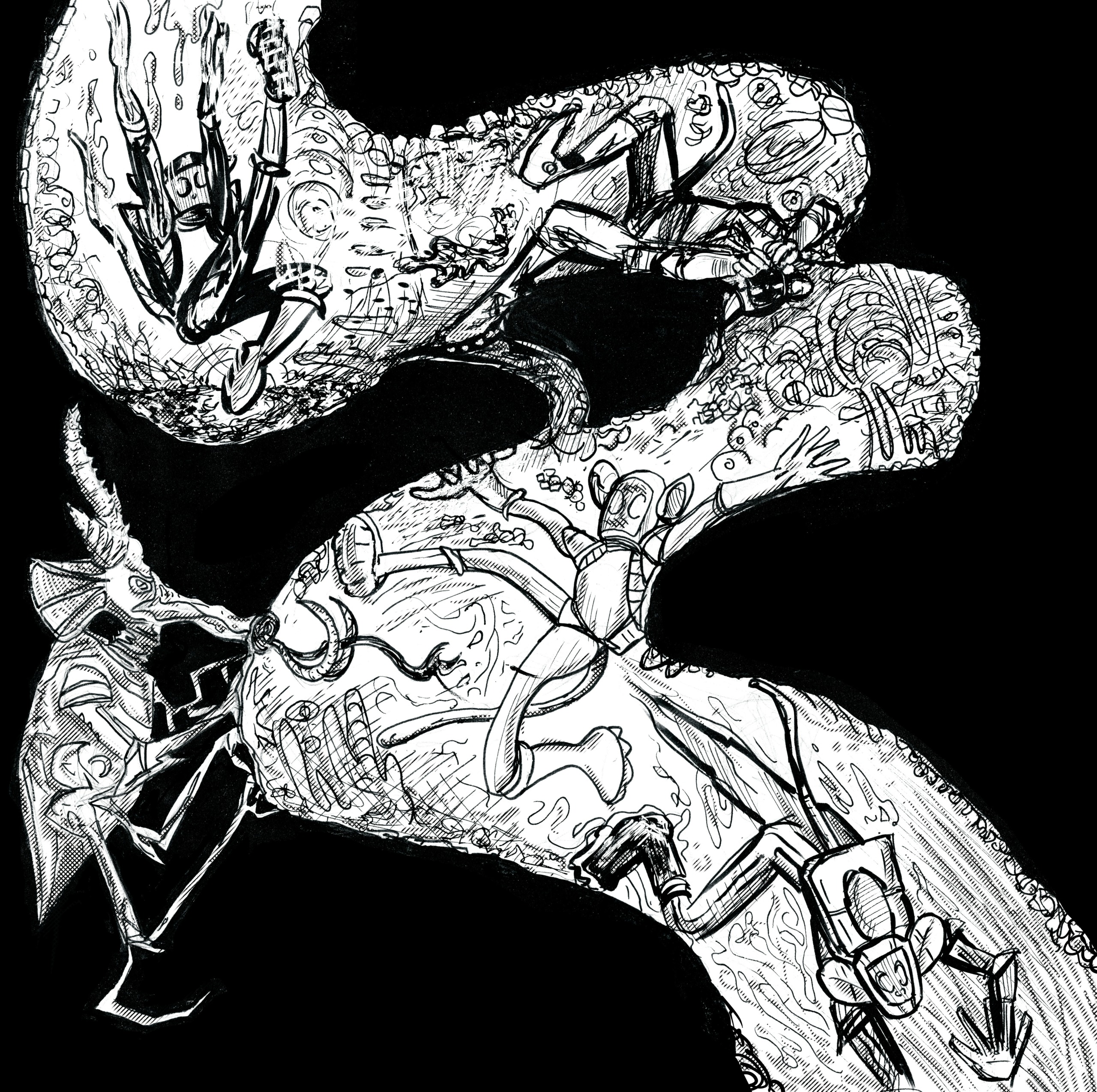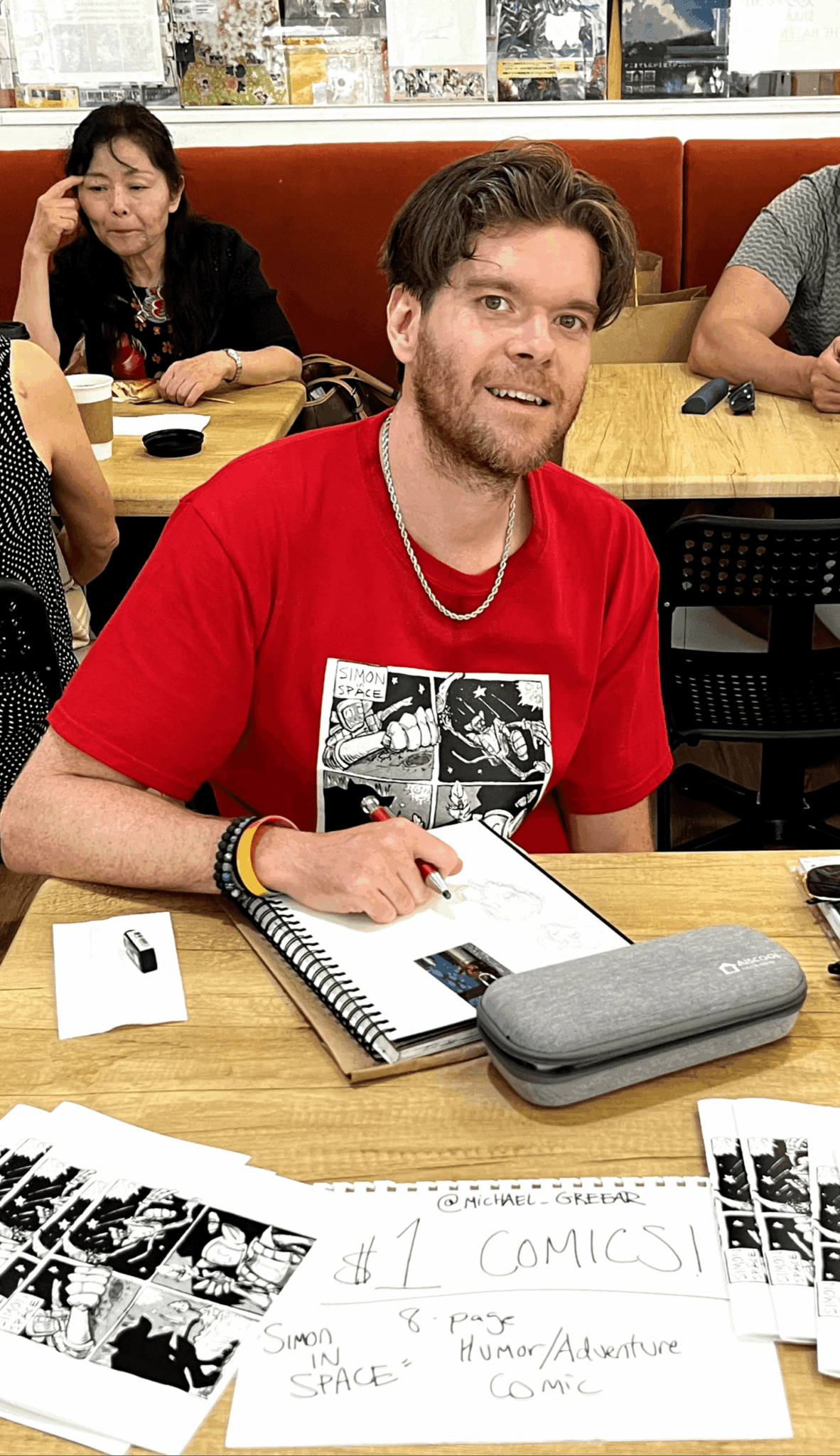We caught up with the brilliant and insightful Michael Greear a few weeks ago and have shared our conversation below.
Michael , appreciate you joining us today. Can you talk to us about how you learned to do what you do?
My earliest memories are of drawing. I would draw Batman during my preschool classes, or mock-ups of vinyl records for rap songs that I liked on the radio, or I’d try to draw the Ninja Turtles using the box art from the VHS of the first movie. This would have been like 1988-89 probably.
A few years later, the Image revolution happened in the comics industry. This was an explosion of artists who each had unique styles that comics fans had never seen before. They broke rules and shattered norms. The artists who started Image Comics became literally as big as rock stars, like full-on Beatlemania style, and I looked up to them because they made it to that level by creating their own lane. I became dedicated at an early age to following in their footsteps and joining that conversation.
When it was time for me to go to college, I initially started on an AS in Graphic Design at Pensacola State College (then PJC). This allowed me to take a ton of studio art classes as well as classes using Photoshop and Illustrator. It took a few semesters for me to unlearn the ways I had drawn up until then and learn how to do it the fine arts way. We didn’t even use pencils, we used blocks of charcoal and a shammy cloth. This was how I learned composition and how to render form by adding or subtracting shadows (as opposed to the comic book method I had learned of building up from a stick figure).
Eventually I caught on and made some pretty good stuff for where I was at. My drawing teacher, Susan Meyers, taught me how to capture the audience’s eye using a compositional hierarchy, and then keep it captured by moving it around the page with dynamic line art, so that the drawing becomes hypnotic. She also threw any strict adherence to realism out the window, saying “the goal of a photo is to capture a moment, the goal of a drawing is to capture your reaction to a moment.” That blew my mind.
I soon decided to stay in school for a four-year degree in Print Journalism with a minor in Art at University of West Florida. In addition to honing my art skills, I also learned how to write, edit, and lay out articles for a publication. This gave me the other half of the necessary skills I would need for making my own independent comics.
I gave up on the newspaperman thing early on, deciding to instead move to NYC and try to synthesize what I’d learned in school to get into the comics industry. At first I wanted to be a writer, but in order to show off my writing I’d have to present people with a fully formed comic, so I decided to just do everything myself. I now consider myself a cartoonist because bringing a project from an idea all the way to a full-on print comic is probably the coolest thing in the whole wide world to me.
And because I just kept hearing one horror story after another about entrusting your life to a career in comics, I went ahead and got a nursing license. So now I have an exciting day job based in science and compassion that allows me ample means to create and publish my art.


Awesome – so before we get into the rest of our questions, can you briefly introduce yourself to our readers.
I am an award-winning comic strip creator (from back in my college days) and an independent cartoonist, and I have self-published my works in print as well as on digital platforms such as ComiXology, WebToons and IndyPlanet. All of my work to date can be found on my website, 7BrainComics.com.
My store on IndyPlanet is the best way outside of NYC to get physical copies of my work, however at the time of this interview that store is still being set up. If readers want to follow me on social media, I can keep them updated on the availability of those books.
In addition to comics, I’ve also created a line of t-shirts based on my work (as well as a few fun stickers), which can be found at redbubble.com/people/MikeGreear.
As an independent creator, it falls on me to be both the artist and the business. So, once I’ve created my art, I find places to sell and distribute it online. I also bring it to the public by posting up at cons and shops with copies of my comic, some t-shirts, and various promotional material.
Getting into comics is probably as hard as getting into any kind of career based on creative entertainment, and being an independent cartoonist feels like it is a riskier path than trying to get into the industry as someone who wants to do freelance work, but the trade-off is that I’m my own boss and I don’t have to compromise my art for anyone.
The work I’m most proud of is a psychedelic punk rock space opera called, “Mollie and The Spacediver.” This is an ongoing series of comics about a girl who finds out that her guitar is an alien wizard. Think “Calvin and Hobbs” meets “Jem and The Holograms.” Together they fight alien fascists in a quest to save music itself from being erased from existence. I am currently working on the third volume of this series, and I have never been more excited about a comic. The earlier volumes trace my progress as a cartoonist from an all-digital beginner to someone experimenting with a hybrid ink/digital format. My latest stuff is me claiming my style and “leaving it all out on the field” for my readers.
I’m also excited about a project that picked up a lot of steam last year called “Simon in Space.” This is a black-and-white “silent comic” about a cute and curious monkey/cat dude who explores space and gets into trouble. I have a big idea for him going forward and I can’t wait to unveil it once I have all the details worked out.


Can you tell us about a time you’ve had to pivot?
So a pivot is a weird thing, because in the moment it can feel like a defeat.
When I was living in NYC and trying to break into comics, I spent a lot of time working a day job that, while it did become the backbone of my social life, was a bit soul-draining. I was making the money I needed to make, but I wasn’t doing anything to contribute to society. This is what led me to pursue nursing school. However, just as I was getting started, the pandemic happened. I went from being enrolled at Hunter College to moving to New Mexico and starting from scratch with the hope that I’d someday be able to return to my city.
This was a pretty tough time for me, and it required a lot of growth on my part to get through. Throughout this whole time, I never stopped working on my art and moving forward as an artist.
Flash forward to five years later, I have a nursing degree and a license to practice in New York. At the time of this interview, I’m a few days away from moving back to the city and starting a new life there as someone who can contribute to his community in meaningful ways.
In addition to all that, when I took a step back and looked at all the art I created during this time, I realized I had enough banked to start a small comics empire. So now I’m returning to my old life with a new career and multiple comics, clothes and collectibles to bring to the world. I am booking cons and making connections with people who want to work with me.
So what felt like an “L” at the time, losing my city and all my friends to start over in the middle of nowhere, turned out to be a very skillful pivot that has given me one “W” after another after another.


In your view, what can society to do to best support artists, creatives and a thriving creative ecosystem?
I would say, first and foremost, take art into consideration when you’re standing at the voting booth. We have people in power who are actively doing damage to the arts because it’s a few more pennies in their pockets. And they don’t care, it’s no loss to them because they’re not cool enough to understand why art is so important.
Art is the world. Making comics is an art. Making songs is an art. Making tables and chairs is an art. Making burritos is an art. We’re supposed to do this stuff. We’re supposed to start bands with our friends and paint pictures for our moms and dads. It’s how we create the world. It’s how we share our experiences and our dreams, and it’s what we use to resist tyrants and create unity. It’s how we spiritually evolve.
We’re currently on a path toward human beings becoming miserable worker drones in unsafe labor conditions while computer algorithms that do additional harm to our environment create ugly, derivative slop that is sold to us as art. None of that is art. That is a world without art.
So yeah, I would say keep that in mind when you vote, and that includes state and local elections. I would also say support small businesses and independent creators whenever you can. The current state of the economy is probably making it real hard for those smaller entities to thrive, so if you’re hungry, check out the small family-owned place you heard about. If you just saw a Marvel movie last week, go buy a ticket to a Neon picture this week.
And if you have friends in the arts, support them! Go to their plays, their concerts, their galleries. Share their work on social media! Art is based on community, so it doesn’t have to be something that they’re talking about in Entertainment Weekly to be valid and legitimate.
Also, if you have kids who are getting into the arts, support those interests. Even if they don’t become the next Monet or Bach, it will make them a more interesting, well-rounded person, which will still make the world a cooler place to live in.
Contact Info:
- Website: https://www.7BrainComics.com
- Instagram: https://www.instagram.com/mike_greear
- Facebook: https://www.facebook.com/araqnid
- Linkedin: https://www.linkedin.com/in/mikegreear/
- Youtube: https://www.youtube.com/channel/UCKMt7OT2DbJfbv39gHTZhZQ
- Soundcloud: https://soundcloud.com/mikegreear
- Other: https://bsky.app/profile/mikegreear.bsky.social


Image Credits
Michael Greear


